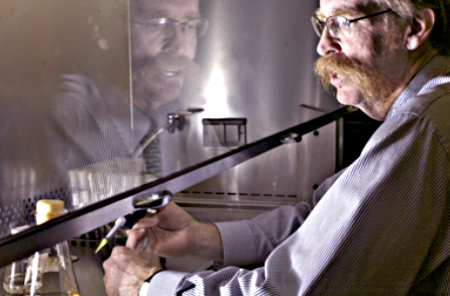
COLOUR SHIFT: Burrell's device will change colour when a bacterial infection is present.
(EDMONTON) Faculty of Engineering-led researchers are developing a handheld device that will help reduce unnecessary antibiotic prescriptions in an effort to ensure the drugs maintain their effectiveness in the wake of growing antimicrobial resistance.
Led by Robert Burrell, chair of the Department of Biomedical Engineering, the team's device will rapidy differentiate between viral and bacterial infections, preventing the overuse of antibiotics, which are only effective against bacteria.
"In the past, you would get a throat swab which would be sent to the lab. The doctor would often prescribe antibiotics before the results of the swab revealed whether the infection was bacterial or viral, Burrell said. If it were viral, the antibiotics would have been unnecessary at best. "This device will allow the doctor to know for certain if a patient needs an antibiotic before they leave their office."
It's important to limit the use of antibiotics to cases in which they are absolutely necessary. Overuse leads to antimicrobial resistance. As more organisms become resistant to antibiotics, the threat to human health from untreatable bacteria rises.
Burrell's device determines the type of infection by identifying whether a molecule called procalcitonin-which is released during bacterial infections but not during viral infections-is present in a patient's bloodstream. Normally, procalcitonin is normally undetectable in the body, but its levels rise when you have a bacterial infection.
The team's goal is to be able to place an antibody on the nanostructure surface of the device that will recognize the molecule in a drop of blood. When procalcitonin binds to the antibody, the colour of the nanostructure changes. Burrell believes the device will be relatively low-cost and easy for frontline physicians to use.
"You would have a small device, you put a sample to be analyzed on it, you wash it off, let it dry and see the colour change," said Burrell.
The project recently received funding from Canadian Institutes of Health Research (CIHR) Point-of-Care Diagnostics in Human Health competition. The funding from CIHR will allow Burrell's team to pursue the patents to move forward with production of the device and prove its efficacy. The entire process to commercialization of a product like this one typically takes several years.
"This funding is incredibly important in making this device a reality," said Burrell.
OR Science-a University of Alberta spin-off company founded by Todd McMullen, a professor in the Department of Surgery-matched the CIHR funding. Other collaborators on the project are Tony Briggs from the Alberta School of Business and Sachdev Sidhu from the University of Toronto.